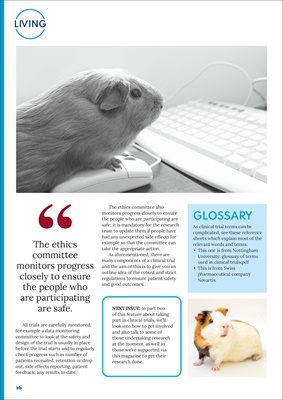
16
LIVING
There are ethics
discussions and
parameters for
all trials and all
institutions that
undertake them.
Guinea pigs and lab rats…
Would you be one? Many have and more will as
researchers continue to ask for participants to take
part in trials to help find solutions and improvements
in diabetes care. We talk to a few and look at what's
involved. By Siobhan Ford and Sue Marshall
Clinical trials are vital to check out
and test new treatments safely
and effectively to support better
care and outcomes for patients.
Otherwise known as medical research
studies, all authorised trials involve a strict
set of approval and monitoring criteria and
the help and agreement of suitable people to
participate who are at the centre of the trial.
Let's take a brief look at what is involved
in setting up a clinical trial and the strict
regulations and checks involved to ensure
patient safety and good outcomes for better
care and quality of life. Trials must follow
good clinical practice which is defined
by the UK government as: "Good clinical
practice (GCP) is a set of internationallyrecognised
ethical and scientific quality
requirements that must be followed
when designing, conducting, recording
and reporting clinical trials that involve
people", as stated in the UK government's
'Good Clinical Practice for Clinical Trials'
guidelines. To see these, click HERE.